

Is a PhD In Statistics Worth It?
At face value, a statistics PhD seems like a sound career investment, the ticket to higher paying jobs and career growth.
It’s no surprise, then, that one of the most common questions we hear is: Are statistics PhD programs worth it for data science jobs?
If we’re just looking at PhD in statistics salaries, sure, from a purely financial perspective, a PhD might be a good investment in your data science career. There’s a strong financial case you can make for earning one.
But beyond the great statistics PhD salary data, there are many other variables that make the answer a little less clear. When you think about the time commitment - almost 8 years - and the average salaries between master’s and PhD students in statistics, you’ll see that there are a number of trade-offs and that the bump in earnings isn’t so significant as to be a no-brainer.
That’s not to say there aren’t tons of great benefits of a PhD, because there are. For one, a PhD provides much more specialized knowledge, which can help you land competitive, more senior-level jobs. (It’s a preferred qualification for many Google jobs, in fact.) And of course, the average starting salaries for statistics PhDs are very enticing.
To help answer the question, “Is a PhD worth it?” we took a closer look at salaries for data scientists and statistics PhDs, as well as some of the pros and cons of pursuing a PhD for your data science career.
PhD In Stats: Salary Comparison
It’s probably not all that surprising that a PhD can increase your earnings, often by 2X or 3X. That’s really across the board, in all industries. For example, according to the Bureau of Labor Statistics, median weekly pay for a PhD ($1,885) was 45% higher than bachelor’s ($1,305) in 2020.
When you take a closer look at PhDs by field, though, PhDs in math and statistics have some of the best starting salaries in any industry. According to 2019 Survey of Doctorate Recipients data , recipients of a PhD in statistics have an average median starting salary of $140,000 (when pursuing a job in industry). That’s better than business administration, economics, and engineering:
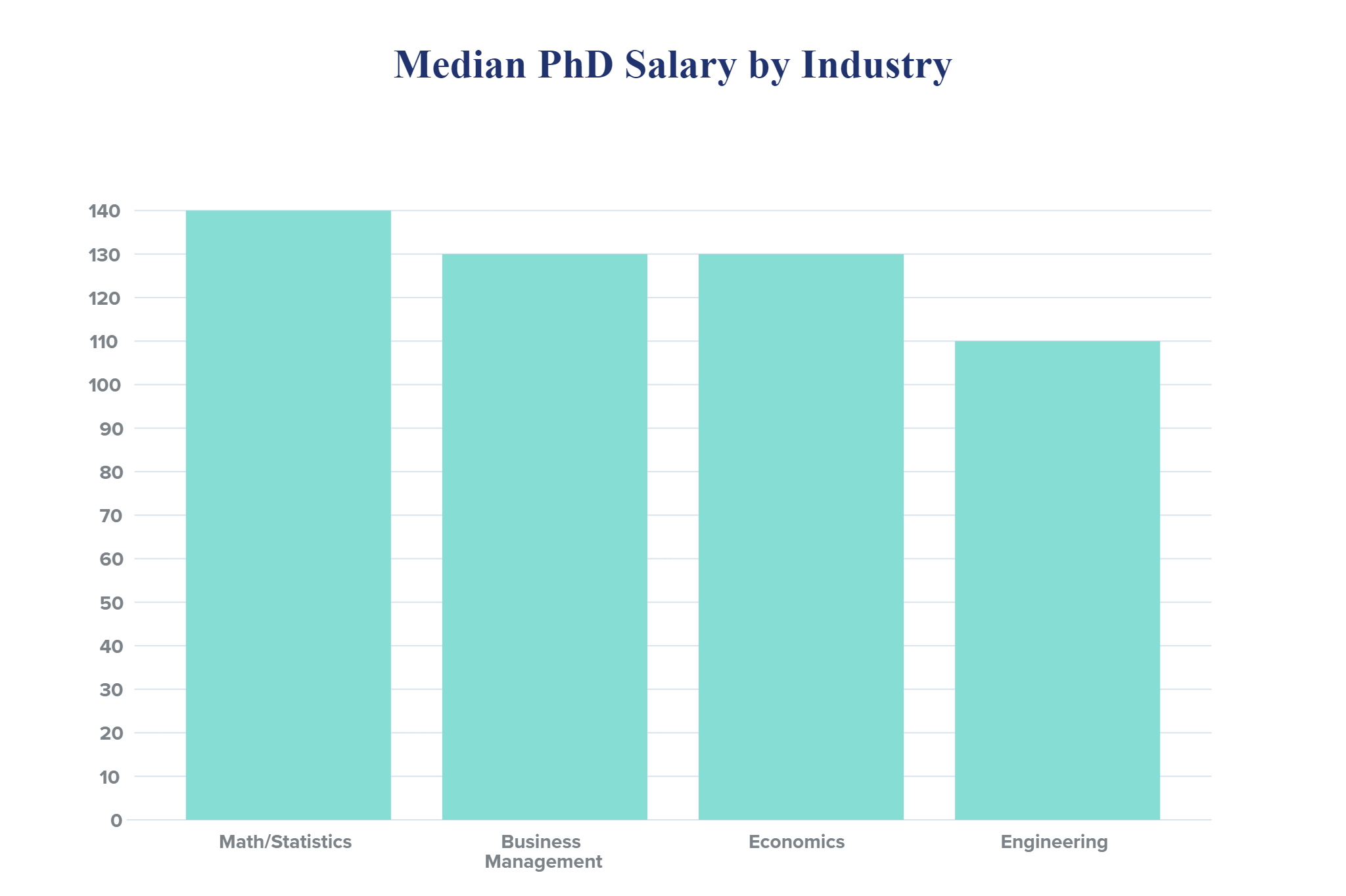
A PhD also results in a pretty big bump in salary compared to just earning a bachelor’s or master’s degree. For instance, median salaries for statistics PhD are two times that of bachelor’s recipients and 1.5 times that of master’s of statistics recipients:
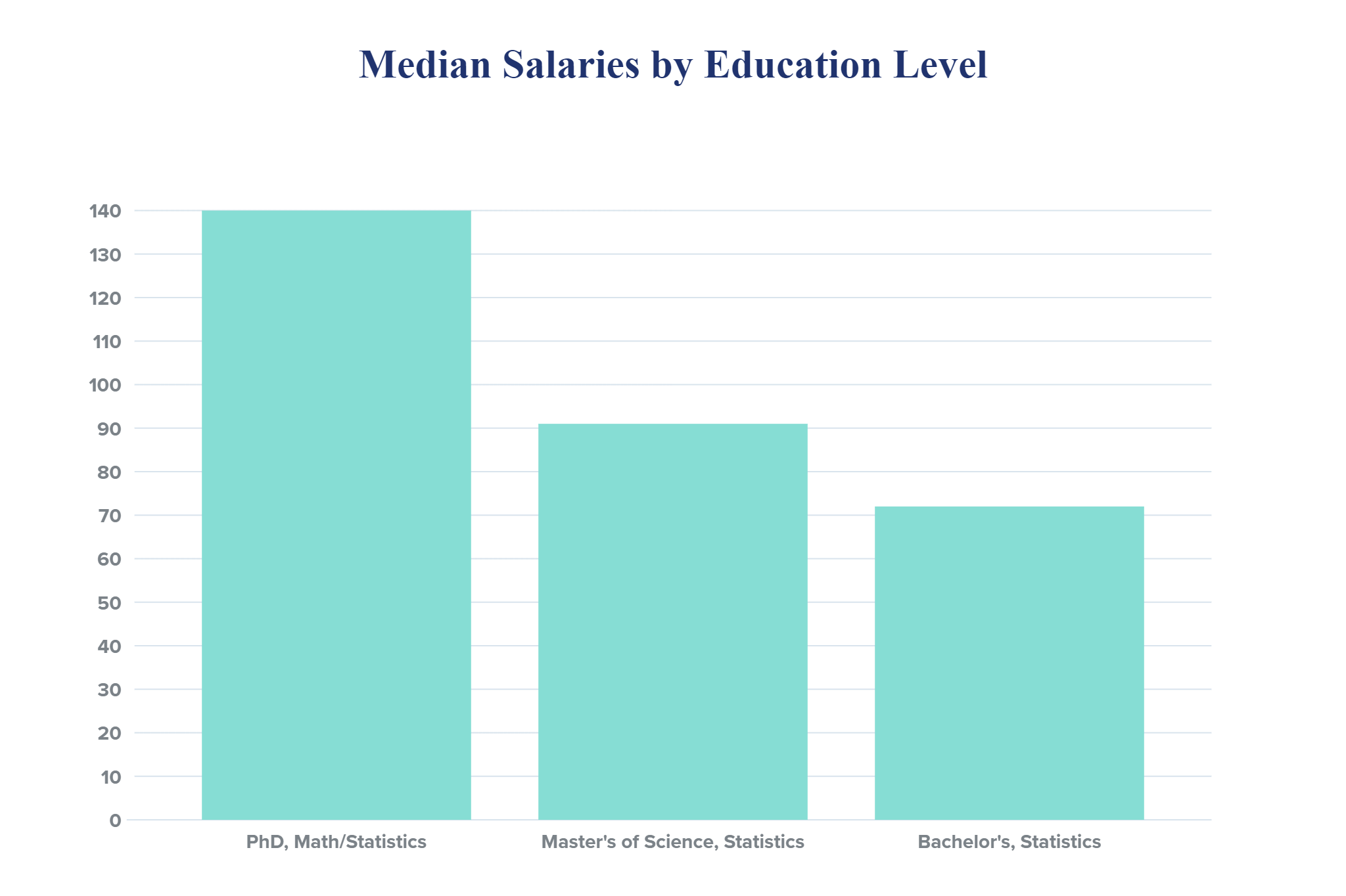
In other words, if you’re looking at the question through a purely financial lens, yes, a PhD in statistics is worth it.
But there’s one caveat. The lifetime earnings of a PhD vs a master’s recipient in statistics isn’t all too significant (on average about $3.6 million vs $3.45 million).
PhD in Stats: The Skills Bump
A big reason why starting salaries are so good for statistics PhDs is that your knowledge will be much more specialized.
Master’s in statistics programs tend to provide broad knowledge in the field. You’ll get a strong foundation of the fundamentals, and become well-versed in many different statistical concepts and methodologies. But you likely won’t get the depth of knowledge that you would from a PhD program.
A PhD differs quite a bit, and these programs are built around research. Here’s how it usually works: After completing initial coursework (usually 2 years), you’ll choose an area to focus your research. And then, you’ll spend 3-5 years researching that topic and preparing a dissertation on it.
The difference in focus, therefore, provides you with very specialized knowledge, and that’s a big reason why starting PhD salaries tend to be so high.
Is It Worth It? Delayed Earnings and Career Goals
Of course, the biggest trade-off in getting all this knowledge is the time commitment. PhD candidates in statistics spend nearly a decade – 7.75 years on average – earning the credential.
And that commitment is something you have to consider to really know if it’s worth it to you. Do you want to make this time commitment and spend the next 8 years researching a topic?
As a master’s recipient, you’ll gain a lot of useful professional skills and can jump right into a career. Sure, you might fully understand advanced statistical methodologies, but you will have a strong grasp of the fundamentals. And you can learn a lot to advance your career with professional development and on-the-job training.
Although they spend a lot of time researching a topic, PhDs do have one advantage: They’re often qualified for more senior-level data science jobs. At Google, for example, a PhD is a preferred qualification for many of their data science jobs, and that’s increasingly true for many FAANG companies.
A PhD Is a Good Investment, But With One Caveat
There’s a lot of reasons why you might consider a PhD in statistics. Salaries, for one, are some of the highest in data science , and job growth for statisticians is about 30% year-over-year. You’ll also have a lot of specialized knowledge that will increase your worth and prepare you for senior-level positions.
But here’s the caveat:
Even if you earn a PhD, you’ll still have a skills gaps that you need to fill, especially if you’re interested in a career in data science. There will skills - like coding or machine learning - that you might need to brush up on.
So if you’re expecting that a PhD is a ticket to a FAANG job, it’s not. But the specialized knowledge that it brings is, increasingly, a preferred qualification.
If you want to read more topics that are similar to this one, consider reading more through our blog where we dive into topics such as our PostgreSQL Interview Questions Guide , Machine Learning Case Studies , and even this article on ‘ Is Data Science a Good Career? ’
Learn and grow more by using resources here at Interview Query !
A Short Guide for Students Interested in a Statistics PhD Program
This summer I had several conversations with undergraduate students seeking career advice. All were interested in data analysis and were considering graduate school. I also frequently receive requests for advice via email. We have posted on this topic before, for example here and here , but I thought it would be useful to share this short guide I put together based on my recent interactions.
It’s OK to be confused
When I was a college senior I didn’t really understand what Applied Statistics was nor did I understand what one does as a researcher in academia. Now I love being an academic doing research in applied statistics. But it is hard to understand what being a researcher is like until you do it for a while. Things become clearer as you gain more experience. One important piece of advice is to carefully consider advice from those with more experience than you. It might not make sense at first, but I can tell today that I knew much less than I thought I did when I was 22.
Should I even go to graduate school?
Yes. An undergraduate degree in mathematics, statistics, engineering, or computer science provides a great background, but some more training greatly increases your career options. You may be able to learn on the job, but note that a masters can be as short as a year.
A masters or a PhD?
If you want a career in academia or as a researcher in industry or government you need a PhD. In general, a PhD will give you more career options. If you want to become a data analyst or research assistant, a masters may be enough. A masters is also a good way to test out if this career is a good match for you. Many people do a masters before applying to PhD Programs. The rest of this guide focuses on those interested in a PhD.
What discipline?
There are many disciplines that can lead you to a career in data science: Statistics, Biostatistics, Astronomy, Economics, Machine Learning, Computational Biology, and Ecology are examples that come to mind. I did my PhD in Statistics and got a job in a Department of Biostatistics. So this guide focuses on Statistics/Biostatistics.
Note that once you finish your PhD you have a chance to become a postdoctoral fellow and further focus your training. By then you will have a much better idea of what you want to do and will have the opportunity to chose a lab that closely matches your interests.
What is the difference between Statistics and Biostatistics?
Short answer: very little. I treat them as the same in this guide. Long answer: read this .
How should I prepare during my senior year?
Good grades in math and statistics classes are almost a requirement. Good GRE scores help and you need to get a near perfect score in the Quantitative Reasoning part of the GRE. Get yourself a practice book and start preparing. Note that to survive the first two years of a statistics PhD program you need to prove theorems and derive relatively complicated mathematical results. If you can’t easily handle the math part of the GRE, this will be quite challenging.
When choosing classes note that the area of math most related to your stat PhD courses is Real Analysis. The area of math most used in applied work is Linear Algebra, specifically matrix theory including understanding eigenvalues and eigenvectors. You might not make the connection between what you learn in class and what you use in practice until much later. This is totally normal.
If you don’t feel ready, consider doing a masters first. But also, get a second opinion. You might be being too hard on yourself.
Programming
You will be using a computer to analyze data so knowing some programming is a must these days. At a minimum, take a basic programming class. Other computer science classes will help especially if you go into an area dealing with large datasets. In hindsight, I wish I had taken classes on optimization and algorithm design.
Know that learning to program and learning a computer language are different things. You need to learn to program. The choice of language is up for debate. If you only learn one, learn R. If you learn three, learn R, Python and C++.
Knowing Linux/Unix is an advantage. If you have a Mac try to use the terminal as much as possible. On Windows get an emulator.
Writing and Communicating
My biggest educational regret is that, as a college student, I underestimated the importance of writing. To this day I am correcting that mistake.
Your success as a researcher greatly depends on how well you write and communicate. Your thesis, papers, grant proposals and even emails have to be well written. So practice as much as possible. Take classes, read works by good writers, and practice . Consider starting a blog even if you don’t make it public. Also note that in academia, job interviews will involve a 50 minute talk as well as several conversations about your work and future plans. So communication skills are also a big plus.
But wait, why so much math?
The PhD curriculum is indeed math heavy. Faculty often debate the possibility of changing the curriculum. But regardless of differing opinions on what is the right amount, math is the foundation of our discipline. Although it is true that you will not directly use much of what you learn, I don’t regret learning so much abstract math because I believe it positively shaped the way I think and attack problems.
Note that after the first two years you are pretty much done with courses and you start on your research. If you work with an applied statistician you will learn data analysis via the apprenticeship model. You will learn the most, by far, during this stage. So be patient. Watch these two Karate Kid scenes for some inspiration.
What department should I apply to?
The top 20-30 departments are practically interchangeable in my opinion. If you are interested in applied statistics make sure you pick a department with faculty doing applied research. Note that some professors focus their research on the mathematical aspects of statistics. By reading some of their recent papers you will be able to tell. An applied paper usually shows data (not simulated) and motivates a subject area challenge in the abstract or introduction. A theory paper shows no data at all or uses it only as an example.
Can I take a year off?
Absolutely. Especially if it’s to work in a data related job. In general, maturity and life experiences are an advantage in grad school.
What should I expect when I finish?
You will have many many options. The demand of your expertise is great and growing. As a result there are many high-paying options. If you want to become an academic I recommend doing a postdoc. Here is why. But there are many other options as we describe here and here .

- Doing a PhD in Statistics
We live in a data-rich world. The study of statistics allows us to better understand data, measure uncertainty, and calculate risk. The applications of such knowledge are widespread – from economics to medicine. A PhD in Statistics will give you a deep understanding of the mathematical framework which underpins data analysis as we know it. Read on to find out the key information about a PhD in statistics, and whether it is worth it for you.
What Does a PhD in Statistics Focus On?
A Statistics PhD programme can focus on:
- Statistical theory and statistical methods
- Bayesian statistics
- Covariance modelling
- High dimensional data
- Probability theory
- Causal inference
- Extreme value theory
- Non-parametric regression
- Symbolic computation
- Applied statistics
The list above is only a small sample of the many different areas within probability and statistics. Many PhD research projects place a particular emphasis on statistics within environmental, biomedical, and social science. Aside from this there is also overlap with other field such as computer science, applied mathematics, and linear algebra.
Browse PhDs in Statistics
Application of artificial intelligence to multiphysics problems in materials design, study of the human-vehicle interactions by a high-end dynamic driving simulator, physical layer algorithm design in 6g non-terrestrial communications, machine learning for autonomous robot exploration, detecting subtle but clinically significant cognitive change in an ageing population, entry requirements for a phd in statistics.
Most Statistics PhD programmes require applicants to have, or expect to obtain, a bachelor’s degree (or international equivalent) in Mathematics or Statistics. However, many Statistics PhD research projects also accept applications from graduate students with a bachelor’s degree in other subjects if they involve a significant mathematical component (such as Data Science , Physics, or Computer Science). Many universities expect first class honours due to the high competition for places, though for some institutions second class honours (2:1) is adequate.
It is also common for universities to accept second class honours (2:1), if the graduate has a master’s degree or relevant work experience.
Universities typically expect international students to provide evidence of their English Language ability. This is usually benchmarked by a IELTS score of 6.5 (with a minimum score of 6 in each component), a TOEFL (iBT) score 92, a CAE and CPE score of 176 or another equivalent. The exact score requirements may differ across different universities.
Duration and Programme Types
The typical doctoral programme in Statistics takes 3-4 years full-time, or 6 years part-time.
A PhD research project in Statistics can focus on a particular application of statistics. For example, you may undertake a PhD in statistical genomics or biostatistics, which would involve interdisciplinary work and additional training modules to understand how statistics can improve biological and genetic study.
In addition to the statistics course modules, you will likely undertake ‘ transferable skills ‘ training in communication, management, and commerce – all of which are skills a good postgraduate research student needs.
As with most PhDs, you will have to complete a dissertation at the end of your postgraduate research project, and undertake an oral examination known as the viva , where you are required to defend your dissertation to a supervisory committee/dissertation committee usually made up of two examiners.

Costs and Funding
Annual tuition fees for PhDs in Statistics are typically around £4,000 to £5,000 for UK/EU students. Tuition fees for international students are usually much higher, typically around £20,000 – £25,000 per academic year. Tuition fees for part time programmes are typically scaled down according to the programme length.
Some Statistics PhD programmes also have additional costs to cover laboratory resources, administration and computational costs.
Together with EPSRC and other national funding sources, many Universities offer postgraduate studentships which cover the tuition fees for Statistical PhD programmes. EPSRC DTA research studentships are available in all areas for UK and EU students. Students who are normally resident in the EU but not in the UK are eligible for EPSRC PhD studentships, but the awards in such cases currently cover only the course fees, not maintenance stipends .
Available Career Paths in Statistics
One of the key advantages of Statistics is that it is a fundamental concept which underpins most industries. Consequently, there are an abundance of career paths available for Statistics PhD doctorates such as agriculture, forensics, machine learning, informatics, geosciences, law and biomathematics.
Examples of common destinations for a Statistics PhD student include:
- Actuarial Science – Actuaries are responsible for analysing data to help non-specialists make informed decisions about risks. A good understanding of probability and investment is crucial in this field. Salaries for Statistics PhD students in this field vary, but with around 10 years’ experience typically are around £60,000.
- Environmental statistician – In this role, Statistics doctorates use their knowledge to contribute to environmental study. This can include monitoring climate patterns, carrying out flood risk assessments, or transforming large amounts of temperature data into information for the public.
- Data Analyst – Some people use their PhD in stats to become data analysts, responsible for data management, developing automated processes, tracking KPIs, and more. Data analysts can be found in various industries form logistics & transport to marketing. Again, with experience Statistics doctorates in this path can expect a lucrative salary.
- Medical statistician – PhD graduates in the medical field aid health research in a number of ways, for example analysing data from clinical studies to identify patterns. The NHS, private health companies and the pharmaceutical industry are common employers for those with a PhD degree in statistics or applied statistics.
- University lecturer – Often PhD students opt to stay in academia. This can be as a university lecturer where you will teach students about statistical theory.
Browse PhDs Now
Join thousands of students.
Join thousands of other students and stay up to date with the latest PhD programmes, funding opportunities and advice.
Ph.D. in Statistics
Our doctoral program in statistics gives future researchers preparation to teach and lead in academic and industry careers.
Program Description
Degree type.
approximately 5 years
The relatively new Ph.D. in Statistics strives to be an exemplar of graduate training in statistics. Students are exposed to cutting edge statistical methodology through the modern curriculum and have the opportunity to work with multiple faculty members to take a deeper dive into special topics, gain experience in working in interdisciplinary teams and learn research skills through flexible research electives. Graduates of our program are prepared to be leaders in statistics and machine learning in both academia and industry.
The Ph.D. in Statistics is expected to take approximately five years to complete, and students participate as full-time graduate students. Some students are able to finish the program in four years, but all admitted students are guaranteed five years of financial support.
Within our program, students learn from global leaders in statistics and data sciences and have:
20 credits of required courses in statistical theory and methods, computation, and applications
18 credits of research electives working with two or more faculty members, elective coursework (optional), and a guided reading course
Dissertation research
Coursework Timeline
Year 1: focus on core learning.
The first year consists of the core courses:
- SDS 384.2 Mathematical Statistics I
- SDS 383C Statistical Modeling I
- SDS 387 Linear Models
- SDS 384.11 Theoretical Statistics
- SDS 383D Statistical Modeling II
- SDS 386D Monte Carlo Methods
In addition to the core courses, students of the first year are expected to participate in SDS 190 Readings in Statistics. This class focuses on learning how to read scientific papers and how to grasp the main ideas, as well as on practicing presentations and getting familiar with important statistics literature.
At the end of the first year, students are expected to take a written preliminary exam. The examination has two purposes: to assess the student’s strengths and weaknesses and to determine whether the student should continue in the Ph.D. program. The exam covers the core material covered in the core courses and it consists of two parts: a 3-hour closed book in-class portion and a take-home applied statistics component. The in-class portion is scheduled at the end of the Spring Semester after final exams (usually late May). The take-home problem is distributed at the end of the in-class exam, with a due-time 24 hours later.
Year 2: Transitioning from Student to Researcher
In the second year of the program, students take the following courses totaling 9 credit hours each semester:
- Required: SDS 190 Readings in Statistics (1 credit hour)
- Required: SDS 389/489 Research Elective* (3 or 4 credit hours) in which the student engages in independent research under the guidance of a member of the Statistics Graduate Studies Committee
- One or more elective courses selected from approved electives ; and/or
- One or more sections of SDS 289/389/489 Research Elective* (2 to 4 credit hours) in which the student engages in independent research with a member(s) of the Statistics Graduate Studies Committee OR guided readings/self-study in an area of statistics or machine learning.
- Internship course (0 or 1 credit hour; for international students to obtain Curricular Practical Training; contact Graduate Coordinator for appropriate course options)
- GRS 097 Teaching Assistant Fundamentals or NSC 088L Introduction to Evidence-Based Teaching (0 credit hours; for TA and AI preparation)
* Research electives allow students to explore different advising possibilities by working for a semester with a particular professor. These projects can also serve as the beginning of a dissertation research path. No more than six credit hours of research electives can be taken with a single faculty member in a semester.
Year 3: Advance to Candidacy
Students are encouraged to attend conferences, give presentations, as well as to develop their dissertation research. At the end of the second year or during their third year, students are expected to present their plan of study for the dissertation in an Oral candidacy exam. During this exam, students should demonstrate their research proficiency to their Ph.D. committee members. Students who successfully complete the candidacy exam can apply for admission to candidacy for the Ph.D. once they have completed their required coursework and satisfied departmental requirements. The steps to advance to candidacy are:
- Discuss potential candidacy exam topics with advisor
- Propose Ph.D. committee: the proposed committee must follow the Graduate School and departmental regulations on committee membership for what will become the Ph.D. Dissertation Committee
- Application for candidacy
Year 4+: Dissertation Completion and Defense
Students are encouraged to attend conferences, give presentations, as well as to develop their dissertation research. Moreover, they are expected to present part of their work in the framework of the department's Ph.D. poster session.
Students who are admitted to candidacy will be expected to complete and defend their Ph.D. thesis before their Ph.D. committee to be awarded the degree. The final examination, which is oral, is administered only after all coursework, research and dissertation requirements have been fulfilled. It is expected that students will be prepared to defend by the end of their fifth year in the doctoral program.
General Information and Expectations for All Ph.D. students
- 2023-24 Student Handbook
- Annual Review At the end of every spring semester, students in their second year and beyond are expected to fill out an annual review form distributed by the Graduate Program Administrator.
- Seminar Series All students are expected to attend the SDS Seminar Series
- SDS 189R Course Description (when taken for internship)
- Internship Course Registration form
- Intel Corporation
- Berry Consultants
Attending Conferences
Students are encouraged to attend conferences to share their work. All research-related travel while in student status require prior authorization.
- Request for Travel Authorization (both domestic and international travel)
- Request for Authorization for International Travel
PhD in Statistics

Students pursuing a PhD in statistics tackle the deeper problems in statistics and apply them to real-world applications in academic settings and in industries as diverse as banking and healthcare.
Value Proposition Description
As the need for skilled statisticians increases, WPI’s PhD in statistics offers a rigorous plan for students who enjoy the field’s challenges, who want to forge new paths, and who anticipate solving original problems. The program offers advanced coursework and research in statistics while imparting critical-thinking and problem-solving skills.
Students in this interdisciplinary program work closely with accessible faculty and often collaborate with researchers in data science, bioinformatics and computational biology, engineering, and business. Students demonstrate their competency at gathering vast amounts of numerical facts (data), evaluating it, and translating or presenting the findings and results for applications in various fields.
The knowledge gained in this program provides real-world opportunities for careers in data-driven industries. Companies use enormous amounts of data to help develop more targeted products. The healthcare industry has great need for statisticians who can help develop new drug technologies or conduct clinical trials. Students are supported in research that will solve puzzles and patterns in big data.

Students entering the program with a BS must successfully complete 90 semester hours of graduate work (students with an MS must complete 60 semester hours). At least 30 semester hours must be spent in dissertation research. Full-time residency at WPI is required for at least one continuous academic year of graduate work.
- General Courses (credited for students with MS), 30 credits
- Research Preparation Phase, 24-30 credits
- Research-related Courses or Independent Studies, 9-18 credits
- PhD Project, 1-9 credits
- Extra-departmental Studies, 6 credits
- Dissertation Research, at least 30 credits
- General Comprehensive Exam
- PhD project
- Preliminary Examination
- PhD Dissertation
Students entering with a BS must choose six statistical and mathematical courses from those listed below:
Statistical courses.
MA540 Probability and Mathematical Statistics I
MA541 Probability and Mathematical Statistics II
MA542 Regression Analysis
MA543 Statistical Methods for Data Science
MA546 Design and Analysis of Experiments
MA547 Design and Analysis of Observational and Sampling Studies
MA548 Quality Control
MA549 Analysis of Lifetime Data
MA550 Time Series Analysis
MA552 Distribution-free and Robust Statistical Methods
MA554 Applied Multivariate Analysis
MA556 Applied Bayesian Statistics
MA584 Statistical Methods in Genetics and Bioinformatics
Mathematical Courses
MA502 Linear Algebra
MA503 Lebesgue Measure and Integration
MA510 Numerical Methods
MA514 Numerical Linear Algebra
MA528 Measure Theoretic Probability Theory
You may consider completing approved independent studies work in advanced mathematical statistics, advanced multivariate statistics, advanced survey sampling, advanced linear model, generalized linear model, advanced Bayesian statistics, advanced time series, advanced measure-theoretical probability, or advanced statistical genetics.
Similar Majors

Refer a Friend
Do you have a friend, colleague, or family member who might be interested in Worcester Polytechnic Institute’s (WPI) graduate programs? Click below to tell them about our programs.
Our PhD program is highly competitive, and it offers an excellent foundation for future scholars and leaders in statistics. Through rigorous and comprehensive training and research experiences in statistics and related areas, you’ll be ready for leadership roles in academia, industry, and government. WPI’s program requires you to sharpen your critical-thinking and problem-solving skills to address statistical challenges in data-related researches and applications.
WPI’s PhD students work alongside faculty and other PhD students and are involved in diverse projects, both fundamental and interdisciplinary, in these areas:
- Bayesian statistics, survey sampling, and small-area estimation with applications to health, economic, and agricultural data
- High-dimensional statistical learning for big data, including financial time series and spatial statistics
- Biostatistics, statistical genetics and genomics, and statistics in biomedical and clinical studies
- Order restricted inference and meta-analysis
The strong interdisciplinary nature of our PhD program also provides students with enormous possibilities to interact with researchers in other disciplines, including basic sciences, business, data science, bioinformatics, and biomedical engineering.
Faculty Profiles

Professor Wu's research interest lies in applying the power of statistical science to promote biomedical researches. In statistical genetics, he is developing novel statistical theory and methodology to analyze genome-wide association (GWA) data and deep (re)sequencing data to hunt new genetic factors for complex human diseases. In epigenetics, he is studying gene expression regulation mechanisms through chromatin interaction, and RNA silencing pathways in the developmental stages of germ-line cells.

Professor Zou's research focuses on financial time series and spatial statistics with applications to epidemiology, public health and climate change. His most recent research on statistical theory and methodology addressed a wide range of challenges including high dimensionality, complex dependencies, and space and time variations. His research in high-frequency financial data tackled problems with high dimensionality, which is currently a hot topic in statistics.

Teaching is an art. It is something you develop within yourself. It needs hard work, time, creativity and dedication. Giving clear and understandable lectures, facilitating group activities, and interacting with students are all important parts of my teaching. My objectives as a statistics educator are: (1) to teach students about statistical tools and how to use them correctly, (2) to expose students to the structure of statistical analysis, and (3) to teach students how to communicate statistical results and concepts to a variety of audiences.
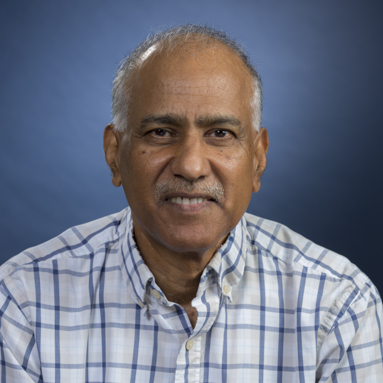
My research centers on quantitative analysis of dependent data, and my current interests include time series analysis, spatial statistics, spatial econometrics, and financial econometrics. My work involves both statistical and econometric methodology development and empirical studies related to financial market and remote sensing data. Although anchored in statistics, my research projects are interdisciplinary and lie at the intersection of statistics, applied probability, data science, finance, and economics.
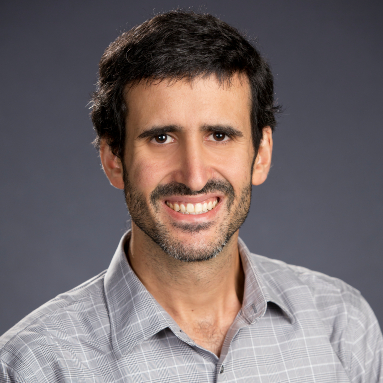
My research in applied statistics focuses on methods for causal inference using large, administrative datasets, primarily with applications in learning sciences and social sciences. I have developed and worked on methods combining machine learning with design-based analysis of randomized trials and matched observational studies, principal stratification and mediation analysis using log data from intelligent tutoring systems, and regression discontinuity designs.
Affiliated faculty in statistics includes the following:
Andrea Arnold
Randy Clinton Paffenroth
Marcus Sarkis-Martins
Stephan Sturm
Zhongqiang Zhang

Getting Involved
Graduate students find a welcoming, diverse, and active community at WPI. The vibrant graduate student government acts as the voice of grad students, whether they are taking courses on campus or from a remote location.
After Graduation
Professionals with expertise in quantitative and data analysis skills are in high demand in industry, government, and academia. The increasing need is expected to continue as more data are produced globally that require interpretation and application. A PhD in statistics opens many opportunities to use your skills to help achieve results that matter. Our PhD graduates in statistics have secured employment at organizations such as Merck &, Co., and Veristat, and at educational institutions including Chapman University, University of Houston, and University of South Carolina.
Become a Leader in Statistics Now
Get ready to elevate your career and take on advanced leadership roles that tackle challenging statistics problems. Our graduates are in-demand and pursue careers in data-driven industries. Maybe you’re wondering how long does it take to get a PhD in statistics or is a PhD in statistics worth it? We are here to answer any questions you may have.
Pursue a PhD in Mathematical Sciences Instead
Are you more interested in pursuing a career in mathematical sciences where you can dive into discrete mathematics, combinatorics, graph theory, and more? Consider our PhD in mathematical sciences and work with our vibrant community of expert faculty members. You’ll collaborate with researchers in the department and across our campus to solve complex problems.
Earn a Master’s in Applied Statistics First
Do you first need to gain the theoretical foundations of applied statistics and how to gather and analyze large amounts of data? Our master’s in applied statistics enables students to tailor a path that aligns with their career goals in a range of areas like biostatistical application, big data analytics, and even social policy analysis. Maybe you’re looking for a broader master’s degree that you can apply your expertise in a range of industries like computer science, business, or engineering. Our master’s in applied mathematics provides students a broad background in mathematics including numerical methods, modeling, materials science, and optimization. If you’re interested in using sophisticated mathematics to solve complex problems in business and industry, consider earning a master’s in industrial mathematics . You’ll build a foundation in numerical methods, modeling, and conduct an industrial professional master’s project.
Gain a Foundation with a Minor in Statistics
If you’re an undergraduate thinking about other applications for statistics because your major is in a different discipline, a minor in statistics will give you the understanding and the tools you need to complete work that uses advanced statistical methods. With this minor, you’ll learn how to design reliable studies and surveys, analyze research results, and model complex data and apply that knowledge to the field you’re in. And if you’re a current undergrad exploring career options in statistics and mathematics, WPI’s career outlook page for statistics and mathematics will give you a broad look at the field.
EXPLORE SMU

Moody School of Graduate and Advanced Studies
Is getting a phd worth it.

Perhaps you’re finishing up a bachelor’s or master’s degree, or maybe you’ve hit a wall in your career. Now you’re wondering: Should I get a PhD? In the long run, is this the best choice for my career and personal goals?
You may have friends who have completed doctorate programs or even observed coworkers or professors excelling with PhDs but wondered if it’s the right fit for you. There’s usually a series of roadblocks between the initial daydreaming and enrolling. You hesitate, wondering if this is the right time, if it will pay off, or if you’ll be able to succeed.
The short answer: Yes. Most PhD students will tell you the time and effort are worth it. The long answer? Ultimately, only you can decide that but the pros outweigh the cons.
What benefits are there to earning a PhD?
Well, most importantly, you’ll get two new letters in front of your name: Dr. Knows A. Lot.
Reputation Building
Jokes aside, earning a PhD earns you credibility . Employers, whether within academia or off-campus, understand the discipline, knowledge, and tenacity required to complete a doctoral program.
In most cases, completing a PhD program is enough for others in your field to consider you an expert. Pursuing and completing a PhD shows all future employers you know your industry and you have the fortitude to work hard.
Return on Investment
It’s not always easy to calculate the monetary value of a PhD, but many PhDs will tell you that the return they’ve received on their investment (ROI) was more than worth it. When it comes to ROI , it matters where you get your PhD.
Depending on your field and the school you choose, the ROI on a PhD is made significantly higher if you don’t have to pay tuition. Many schools, SMU included, offer fellowships and stipends for PhD students, often in addition to a full tuition waiver. This isn’t meant to convince you that PhD students are raking in cash — just a reminder that tuition isn’t necessarily a burden for doctoral students. PhD students do get paid
Pursuit of Passion
You may have experienced the dread that comes with a job search where you’re under qualified. You see the posting. You notice the employer and job title. Wow, this is your dream job . You skim the description and think, “I could probably do that!”. You get to the bottom, “Preferred Qualifications”. Yikes. You’re not quite there. Your PhD will open those doors, remove the barriers, and welcome you to the highest level of your career. Gone are the days of being under qualified. This is your time to shine.
Remember those doors that were closed before? Your PhD helps you find a network of people who can help you open them. Your classmates turn into colleagues, your professors into trusted friends, and those barriers start to fall down as you surround yourself with people who share your passion.
Oh yeah, that little thing. Your passion. The subject and field you’ve been dreaming about since you were a child. Or maybe just since undergrad. It’s become part of your personal identity. Pursuing a PhD allows you to learn more, dig deeper, and climb higher in the field that you already enjoy. Even if you’re not looking to stay in academia forever, the PhD in your chosen field gives you the ability to stay a while longer and decide how best to use your skills.
What are the Reasons Not to Get a PhD?
Getting a PhD has a lot of benefits, but there are risks to consider, too.
The time commitment : this may take years. PhD programs take an average of 6 years to complete.
The financial commitment: if you’re not in a fully-funded program, this may cost a lot. Not only in tuition, but in “lost wages,” too. Most PhD students don’t have time to work on top of earning their degree.
But, the financial commitment is often offset by the earning potential of a PhD. On average, PhDs make over $30,000 more annually than those holding only a bachelor’s degree, but keep in mind that number varies between the humanities, business, and science industries.
The energy commitment: earning a PhD can be hard work. The good news is you’re not in it alone at SMU. We offer a robust career services office and dedicated student support services for PhD students like housing, counseling, and community connections.
The risk: what if this doesn’t work out? But what if it does?
Have you ever considered that in pursuing a PhD, you’ll be the expert on your chosen topic? You’ll have your classmates to lean on, but your thesis is specific to you. Your dissertation, though a lot of work, will put you as the thought leader of that specific topic. Combining your passion, credibility, network, and dreams to launch into your next phase of life.
So, is a PhD worth it? We think so.
Learn more about
doctoral degrees at SMU, and how you can choose the right program and thrive in it, in our Guide to Getting a PhD.

Request more
Information.
Complete the form to reach out to us for more information
Published On
More articles, recommended articles for you, how phd students get paid.
The most common questions (and biggest misconceptions) about getting a PhD revolve around money....
Unlocking Possibilities: What Can You Do With a PhD in English?
The world of academia has long been associated with the pursuit of knowledge, scholarly research...
The Pros and Cons of Getting a PhD
Getting a doctorate is a decision that will impact both your personal and professional life for...
Browse articles by topic
Subscribe to.
DiscoverDataScience.org
Is a PhD in Data Science Worth It?

Created by aasif.faizal
The most advanced option you can find is a Data Science PhD, which is an intensive and long-term commitment from which you will graduate at the very top of your field.
The truth is, many who establish thriving careers in data science don’t hold PhDs, and no one would argue that they are necessary to have on the table as one considers their educational options. Estimates for the number of data science PhDs is around one third of all who attend graduate school for data science. For a certain type of person – one who is highly studious, with an aptitude for and interest in research – PhD programs can be excellent experience that will situate you for a highly specialized career.

If you’re asking yourself, “Do I need a PhD in Data Science?,” the answer is no. (For a more expansive answer to this question, you can take a look at our article here: “Do I need a PhD in Data Science?”)
But is a PhD in Data Science worth it for those who do decide to take it on? The answer, in short, is yes – at least, it can be. This article will explain the greatest rewards of taking on a doctorate program, with information about job options, Data Science PhD salary ranges, and job growth projections. To learn about all of those as well as survey the other degree options for data scientists, read on.
Advantages of a Data Science PhD
So if a PhD in Data Science isn’t necessary to building a high-earning career in big data, what are the advantages of taking on so many years of schooling? To put it simply, the answer is peerless expertise.
It’s true: one can hold just a master’s degree and still find excellent job opportunities in the data sciences, which is why master’s programs are the most popular path for those in the profession. However, it is unquestionable that a doctorate asserts a higher level of mastery and capability than even master’s degree holders have. If you apply for a job with a PhD on your resume, you’ll be instantly asserting that you are as knowledgeable as they come, which in the case of top-ranking (and top-earning) data science positions is exactly what companies are looking for.
Data Science PhD Programs: How They Work
If you think a doctoral degree in Data Science sounds like the right path for you, it’s worth learning about the specifics of a PhD program. Below is an overview of coursework, anticipated duration, and more.
Coursework and Duration
One of the primary differences between a data science PhD and a master’s program is that a doctorate program culminates in testing and a dissertation, while a master’s program does not. Courses in both programs typically include the following:
- Artificial intelligence
- Data management
- Data mining
- Data visualization
- Machine learning
- Software design
Data science PhDs are known for having an especially intensive orientation toward research, especially in the dissertation component of the work. This can extend the duration of a PhD program by several years. While master’s programs typically take two years if students attend them full-time, a PhD program typically adds two or three years of studying to that timeline.
While many who pursue data science PhDs argue that the insight gained from their extensive dissertation work has paid off in the long run, it’s important to ask yourself if you are going to enjoy making such a deep dive into your studies. If the answer is yes, that’s an excellent reason to proceed with your PhD degree. If not, a master’s program may be the more optimal path for you.
The testing process for data science PhDs is also rigorous, with multiple exams along the way to prove competencies in a variety of subjects. These include oral, written, and practical exams. Earning a PhD asserts by default that you have achieved the mastery needed to pass these tests, which is a powerful assertion of your skill and ability from the get-go.
Finding Your Area of Focus
Like with master’s programs, those pursuing data science degrees typically choose a particular area of focus while in school that will lead directly to their professional specialization. This means it’s crucial to get the lay of the land early so that you’re sure you’re picking a path you’re willing to commit to for a long time. (It’s always possible to acquire deeper insight or even pursue new specialties through certification programs, but it’s recommended to start with one focus that tracks with a degree concentration offered by your school.)
Data Science Salaries
The vast field of data science is proving to be an exceptionally fertile ground to grow a career, no matter what focus area you choose. Indeed, according to the Bureau of Labor Statistics , the median annual pay for data scientists overall is an impressive $100,910 per year, well ahead of most other industries. This is an excellent reason to join this burgeoning field, and it’s been enough to motivate droves of people to pursue data science careers of their own.
If you’re impressed by these numbers, consider this: those statistics describe the overall field of data science, not just the jobs of those who hold PhDs. For these highly advanced professionals, the numbers get much higher. Take a look at the job titles in the next section to see the specific wages of high-ranking data science positions.
While the sudden rush of new candidates seeking data science positions may sound daunting, the job growth statistics for data scientists all but guarantee that high-quality jobs will be available in your area of focus. This is because of the exceptional projected growth rate of data science jobs, which the Bureau of Labor Statistics estimates to be an incredible 36% by 2031.
There are few other industries that offer as significant salaries across the board with so many new positions available.
So why are data scientists so in-demand, and why is the field growing so rapidly? The answer has everything to do with the rise of technology in all aspects of our lives, in particular the way it has transformed how we do business. The rate at which new data technology is evolving means constant adaptations within the world of big data to keep up with it. For example, recent leaps in the field of machine learning (ML) has greatly increased data capturing capacities, leading to a greater need for specialized data analysts who can help process the information quickly.

Careers for Data Science PhDs
One of the biggest questions for prospective data science PhD candidates is this: what will it lead to? Indeed, given the rigor of a data science PhD program, it’s important to think through the investment you’re making.
Below are some of the most common positions data scientist PhDs pursue, along with data scientist PhD salary ranges and more.
High Level Data Scientist
Data scientists often pursue more focused concentrations in the field, but their overall functions include collecting and categorizing data so that it can best be leveraged by organizations. Those who hold doctorate degrees in data science are often available for the highest levels of these jobs, which are roles responsible for important decision making functions, oftentimes communicating with executives and other heads of staff on the key insights they’ve acquired in their field.
As you might expect, these high-ranking data science roles earn significant amounts of money. According to the Bureau of Labor Statistics, data scientists earning in the 90th percentile of the field make an annual mean wage of $167,040.
Business Analyst
Business analysts, also often known as management analysts or management consultants, use advanced algorithms to analyze and interpret data that will later be used to guide business strategy. These can be in-house roles at large organizations or consultant positions who are contracted independently on a project basis. Those who excel at business are especially good candidates to pursue this career path.
According to the Bureau of Labor Statistics, management analysts working at the top of their field (in the 90th percentile) earn an annual mean wage of $163,760.
Database Architects
Database architects play a huge role in a business’ data practices, serving as exactly what their name implies – architects who create the virtual structure in which data is stored and organized. It’s imperative that those who hold these roles be highly advanced in their field, as the strength of a business’ database is a crucial factor in the success of its overall operations.
Database architects are highly valued employees and are compensated accordingly. The Bureau of Labor Statistics reports that the top earning database architects in the US make a mean annual wage of $169,500.
Information Security Analysts
The field of cybersecurity is rapidly expanding as new technologies also introduce new types of cyberattacks to databases. Those with rigorous specialization in information security – such as what is conferred by a data science PhD – are ideal candidates to fill these roles. Indeed, companies are unlikely to hire anyone who is not seriously qualified to do this role, as this person will take responsibility for protecting the business’ most vital documents.
The highest earning (90th percentile) information security analysts are reported by the Bureau of Labor Statistics to make a mean annual salary of $165,920.

Other Data Science Degree Options
Now that you understand the benefits of a data science PhD program, it’s worth taking stock of the other data science degree and certification options that are available. Good news: all of these degree types have online options, many of which are part-time. This means you can attend school from anywhere, with any schedule.
Data Science Bachelor’s Degree
If you would like to pursue a data science PhD but don’t yet hold a bachelor’s degree in any subject, you will first need to complete a bachelor’s program. If you are in this position, it’s recommended to concentrate on data science during undergraduate school so that you can get a rich introduction to the field, even perhaps finding the area of focus where you’d like to plan your career.
It is possible to start a career in data science with just a bachelor’s degree, though most elect to pursue some level of graduate program, as you will enter the field at a higher level of responsibility, with pay to match. To learn more about bachelor’s in data science degree programs, take a look at our guide here .
Data Science Master’s Degree
A master’s in data science is the most popular path for those entering the field of big data. This degree will give you the expertise needed to find competitive jobs with significant responsibilities and the excellent salaries that draw so many to the data science profession. The coursework for a master’s degree is quite similar to a PhD, minus the intensive testing and the dissertation.
There are numerous fantastic Master’s in Data Science programs that can give you the experience and education needed to find a great position in the field. When choosing a master’s program, be sure it offers a concentration in your intended area of specialty. To take a look at the top online master’s programs available near you, visit our guide here .
Data Science Associates Degree
If you do not have a bachelor’s degree and would like to get your professional life started quickly, an associates degree program can give you the training you need to pursue some entry-level jobs in the world of data science. It’s important to note that these programs on their own are unlikely to give you the expertise needed for a high-earning data science career, but they can offer excellent exposure to the field and provide you with your first work experience.
To learn more about associates in data science degree programs, enjoy our guide here, which will give you all the information you need.
Data Science Certificate
An alternative to a long-term degree program, data science certificates can build a particular area of skill or expertise that can help situate you on a particular career path in data science. Some data science professionals who hold advanced degrees also decide to take on certificate programs to expand on their areas of knowledge or add to their list of specializations.
To learn more about data science certificate programs, visit our comprehensive guide here .
Data Science Bootcamps
Data science bootcamps are likely the fastest possible way to enter the data science profession. These courses – which usually have remote and in-person options – give you a literal crash course in a particular arena of data science, typically over a period of about twelve weeks. You will leave with a developed skill set that usually tracks with a particular type of entry-level job.
Like with most data science opportunities outside of graduate programs, these bootcamps are unlikely to set you up with a high-ranking data science careers, but they can be an excellent way to build your fluency in programming languages or other data science skills.
Data science bootcamps are booming, with plenty of options all over the country. Take a look at our guide here to find the program that is right for you.
Finding the Path That’s Right for You
If you’re feeling overwhelmed by the different opportunities available in the data sciences, don’t worry. While there are indeed many options that are suited to candidates with different skill sets, interests, and backgrounds, the good news is that most of these options are good, and are likely to significantly help you start your career.
For a more elaborate overview of the different program options in data science, take a look at our program guide here for a complete comparison.

- Related Programs
You're viewing this site as a domestic an international student
You're a domestic student if you are:
- a citizen of Australia or New Zealand,
- an Australian permanent resident, or
- a holder of an Australian permanent humanitarian visa.
You're an international student if you are:
- intending to study on a student visa,
- not a citizen of Australia or New Zealand,
- not an Australian permanent resident, or
- a temporary resident (visa status) of Australia.

Is a PhD worth it?
Careers Published 8 Feb, 2024 · 9-minute read
Studying a higher degree by research isn’t something you choose to do overnight – well, not for most people. So, to help you make this decision, we’ve reached out to some alumni and compiled some data to help you work out if a Doctor of Philosophy would be worthwhile for you.
When you’re considering such a big academic step, it’s normal to wonder: is a PhD worth it?
Anecdotal evidence and statistics both tell us the benefits of PhD study do indeed outweigh the time and effort required. Let’s explore:
- why a PhD is worth it (personal and professional benefits)
- worthwhile reasons to pursue a PhD
- the average salary of a PhD graduate (financial value of a PhD).
Is it worth doing a PhD? (Personal and professional benefits)
For UQ PhD alumni Angie Knaggs, Benjamin Jones and Brigid Lynch, answering this question in hindsight is easy – and the answer is a resounding yes . Their stories may help you make this choice without that advantage of hindsight.
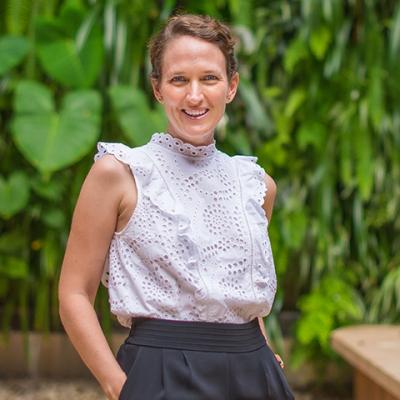
My PhD is as much a part of my identity as the colour of my hair.
Angie’s PhD was a natural continuation of the theses she wrote during her honours and master’s programs, focusing on popular culture representations of masculinity in crisis. In short, she studied the connections in language, culture and communication in shows like Prison Break – rather than watching them for the drama like most of us do.
“I’ve always connected strongly with work in gender and performativity,” says Angie.
“I found the deep dive into thinking and analysis rewarding and engaging. My final thesis remains the piece of work I’m most proud of – even after a decade!”
Her career after completing her PhD was rocky at first. But, as is often the case, the hurdles in the journey ended up emphasising the successes.
“I was very focused on applying for an early-career academic role with the aim of becoming a full-time academic,” says Angie.
“I had experienced a good deal of academic success, and I had publications in top journals. I felt certain I was in a good position to achieve my dreams.
“I went to interview after interview, and it was disheartening to hear how I was almost it or not quite it . What it was, I could never quite work out, but it became increasingly clear to me that I didn’t have it .”
After tutoring and course convening at multiple universities for a while (and quickly growing bored of the constant commuting between campuses), Angie decided to apply for some roles that looked fun and interesting, even if they weren’t at traditional universities. This is how she accidentally fell into – and fell in love with – a whole new world: teaching film studies .
Angie’s new path eventually led to her current role as Senior Learning Specialist – Employability with UQ’s School of Languages and Cultures . Here, she uses her intercultural competencies and higher order thinking skills to great use, as well as publishing about her work in international journals.
“I don’t think I would have been open to following a new pathway if I hadn’t let go of the assumption that my doctorate automatically meant I would have a traditional academic career,” she says.
“Letting that go involved some deep self-work, but it was worth it.”
Now, with over a decade to reflect, Angie sees her PhD as an essential part of how she got to where she is today as well as a vital factor in all her successful career steps along the way.
“I like to think of my PhD as the ultimate employability bootcamp,” she says.
“My PhD gave me an edge – a way of thinking about problems in different ways. It taught me resilience, the ability to pivot and the ability to give and receive feedback. It has also helped get my CV to the top of the pile.”

My PhD equipped me well to move in and out of different roles until I found the one which was best for me.
Ben's career has evolved quite a lot since completing his PhD, in which he investigated the rehabilitation and revegetation of bauxite tailings.
"I chose this topic as I'm interested in environmental science," he says.
"I thought that mine rehabilitation was an important and in-demand area which I could contribute to."
And he has indeed been contributing to this field – most recently in his role with the Queensland Department of Environment and Science, which has allowed him to do satisfying and technical work behind the scenes on high-profile projects. His journey since graduating has been filled with rewarding stepping stones across various positions.
"I've worked in academia and within the private and public sector," says Ben.
"My PhD equipped me well to move in and out of different roles until I found the one which was best for me."
The benefits of a PhD have been obvious and numerous to Ben, both in terms of the career opportunities and lifestyle advantages available. But these benefits aren't necessarily things you have to wait for – you may experience some of them while studying.
"From a remuneration perspective alone, some industry PhD scholarships are quite attractive," says Ben.
"They also offer flexible working hours, and this offers time for other commitments."
"Workplaces are becoming more competitive, especially for recent graduates. Attaining a PhD provides graduates with valuable work experience and specialist knowledge within their chosen field."
Ben recognises a higher degree by research isn't for everyone, but he also sees multiple reasons why a PhD is worth it for candidates.
"Obtaining a PhD is only one of many options, and having a PhD isn't a prerequisite for success," he says.
"However, a PhD is a requirement for many positions within academia or research, so for people embarking on this career path, a PhD is likely essential."
He also believes the PhD path can provide:
- a great opportunity for graduates to ease into working life while still enjoying the familiarity of university life
- a fantastic environment filled with talented and hardworking people, where graduates who haven't landed their dream job can gain work experience and improve their career prospects .
Ultimately, Ben believes the decision of whether to pursue a PhD comes down to personal circumstances and goals.
"I think people need to weigh up their different options and decide what’s best for them."

I now get to work with some of the world's most talented and inspiring epidemiologists. I couldn't think of a better job.
Brigid completed a PhD in population health, looking specifically at how physical activity could impact quality of life for colorectal cancer patients. Her motivation and drive came from combining her previous study areas with a personal passion for the topic.
“The project brought together my undergraduate training (Human Movement Studies and Psychology at UQ) with my interest in epidemiology,” says Brigid.
“So, it was something I could really commit to for the long haul.”
Not long after finishing her PhD, Brigid received a postdoctoral fellowship from the National Health and Medical Research Council, funding her for 2 years of international work followed by 2 years back in Australia.
“Having a PhD is a passport to live and work around the globe,” she says.
“As a postdoctoral fellow, I moved to Alberta, Canada, to work with one of the world’s leading researchers in the physical activity and cancer field. After 2 years of snow and Chinook winds, I returned to Australia.
“One of my career highlights was being funded to spend 3 months working at the University of Bristol. Being able to work and study abroad has opened up a lot of opportunities for research collaboration.”
Brigid is now Deputy Head of the Cancer Epidemiology Division at Cancer Council Victoria.
As someone who continues to work in research, Brigid says the benefits of having a PhD are still obvious to her every day. However, she also recognises how a higher degree by research can help those who follow other paths – just like Angie.
“Even for people who want to work in industry or for government, I think there are very clear benefits of a PhD,” says Brigid.
“So many of the skills you develop when doing a PhD are transferrable, such as project management, critical thinking and strong communication.”
An unexpected benefit of a PhD
While Angie and Brigid’s thesis topics and PhD journeys were quite different, there’s one thing they have in common: the first thing that came to mind when asked for the highlights of studying their PhD at UQ. They both went straight to talking about the people.
“The colleagues and friends I met along the journey are a highlight,” says Angie.
“My supervisor remains one of my closest friends and a long-time mentor.”
Brigid whole-heartedly agrees.
“I met some great people along the way, many of whom I still work with in one way or another,” she says.
“I really enjoy dropping into the School of Public Health when I’m in town.”
Building a supportive network was a key benefit for Ben, too.
"My research organisation placed a high value on networking and provided opportunities to grow," he says.
"I've remained in contact with my PhD supervisor and some of my colleagues, and this has given me a network of old friends at UQ."
Doing your PhD at UQ means you'll get to create connections with some of the most influential and highly cited researchers in the country . And yes, some of these researchers might just become your lifelong friends.
Reasons to pursue a PhD
A good way to determine whether a PhD is worth it for you is to consider your motivations – what are your reasons to do a PhD?
For Angie, this boils down to asking yourself 2 key questions:
- Why do you want to do a PhD?
- What do you want to get out of it ?
Hint from Angie: “If the answer to either question involves any person other than yourself, that’s a red flag. You should only ever do a PhD for yourself. It will be the toughest challenge you ever set for yourself – and it’s only worth doing if you’re doing it for yourself.”
Brigid suggests adding these 2 questions to your decision-making process:
- Are you passionate about your field and topic?
- Can you make a difference to the community or contribute new knowledge that could make change happen?
If your reasons to do a PhD are genuine and you have a strong vision of what you’ll study and why, this may make your decision clearer.
The financial value of a PhD
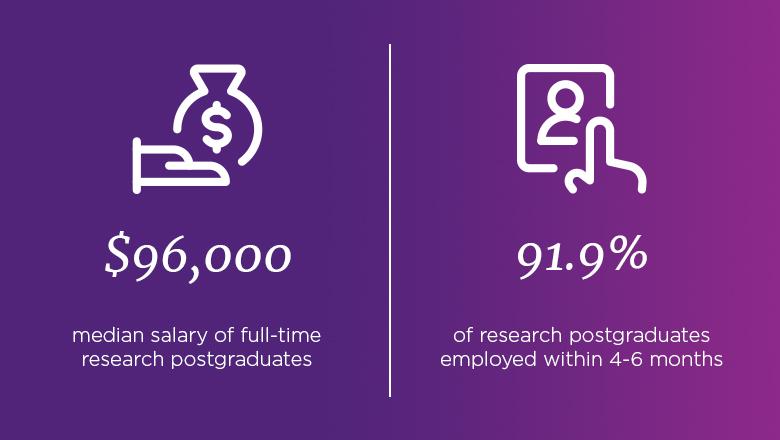
Reading Angie and Brigid’s stories may lead you to think that most candidates are driven solely by their passion for research and that the PhD starting salary is irrelevant. But this is a valid and common consideration for many people. After all, knowing what to expect from a PhD graduate salary can help you justify pursuing your doctorate and plan appropriately for your future career.
The median salary of a PhD graduate is around $96,000pa , though it’s important to note this figure can vary significantly depending on your field.
Wondering if you'll get a PhD income while you study? Find out more about living stipend scholarships .
While making decent money is an enticing perk, perhaps the more important financial benefit of having a PhD is the higher chance of getting (and staying) employed in the first place. According to QILT's Graduate Outcomes Survey , in 2022, the overall employment rate for postgraduate research students in Australia was 91.9%, with 84.7% of graduates in full-time employment.
A comprehensive report from Ribit.net and the Australian Mathematical Sciences Institute shows there is increasing demand for PhD graduates across many industries in Australia. Some of the nation’s most competitive firms are recruiting higher degree by research students from a wide range of disciplines. This further proves Angie and Brigid’s point about PhD research equipping graduates with transferrable and highly employable skills – skills that are recognised beyond the realm of academia.
So, what makes PhD graduates so employable? Well, at UQ, we expect our Career Development Framework plays a large part. This gives all our researchers access to workshops and other opportunities to capitalise on their research skills and turn them into industry practice.
UQ is also home to UniQuest , leaders in research commercialisation. Our researchers can work with UniQuest to translate their academic discoveries into commercial products, effectively taking their research to market.
Whether you’re driven by personal passions, academic ambitions, financial goals or a combination of all these reasons to pursue a PhD, the evidence is strong: a PhD is worth it.
Start your journey today
Share this Facebook X LinkedIn Email
Related stories

How long does a PhD take?
3-minute read

Why do a PhD at UQ?
7-minute read

How to get a PhD scholarship or funding
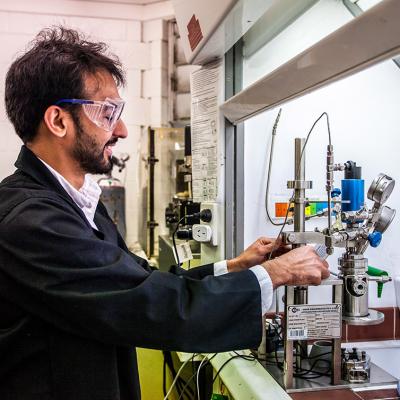
Can you do a PhD without a master’s degree?
6-minute read
Statistics Canada survey shows homeowners’ net worth dwarfs that of renters
A recent Statscan survey found that home ownership provided more wealth even than an employer-sponsored pension plan. Fred Lum/the Globe and Mail
The youngest homeowners typically have a net worth at least 10 times that of renters in the same age cohort, and the gap widens to almost 30 times for those nearing retirement age.
The numbers released Tuesday from the Statistics Canada Survey of Financial Security highlight why many Canadians believe home ownership is the surest path to wealth.
For the youngest families – where the highest income earner was under the age of 35 – the median net worth of homeowners was $457,100 last year, while renters in the same age group had a median net worth of $44,000.
Homeowners aged 55 to 64 had a net worth of $1,241,800, nearly 30 times the renter median of $43,000. And for those above 65, the median net worth for homeowners was $1,081,000 compared with the renter median of $72,000, according to the data.
The Statscan survey found that home ownership provided more wealth even than an employer-sponsored pension plan. Canadians who owned their principal residence but did not have an employer pension plan had a median net worth of $914,000 last year. Meanwhile, those who did have one but did not own their home had a median net worth of $359,000.
“The numbers are stark, worrisome and signal that we have a systemic problem that risks entangling younger Canadians in the cultural addiction to rising home prices to fund wealth accumulation,” said Paul Kershaw, founder of the think tank Generation Squeeze and associate professor at the University of B.C.’s School of Population and Public Health.
The average home price across the country has increased 30 per cent over five years and 64 per cent over the past 10 years, with prices in the regions of Toronto and Vancouver topping $1-million.
The rise in home prices has helped increase homeowners’ wealth across the generations, with the youngest cohort experiencing the largest percentage gain. The median net worth of families under 35 rose by 45 per cent from 2019 through 2023. The second-largest increase in the median net worth was for the group aged between 35 and 44 and seniors.
The high cost of real estate has priced many Canadians out of the market and the country’s home ownership rate has slipped.
Nick Mocan, president of Ontario-based engineering firm C.F. Crozier & Associates Inc., said the survey underscores the urgency that exists in young families to secure home ownership. His company is in its fourth year of offering employees as much as $20,000 for a down payment on their first home and has so far provided the benefit to 36 staff members. Mr. Mocan said the interest he receives from his employees “reflects the strong desire young Canadians have to achieve home ownership to grow their net worth.”
The federal government has been trying to create more affordable housing and has cut taxes and offered cheaper loans for developers to build rental apartment buildings. Ottawa is also reducing the number of immigrants and temporary residents it admits each year, which will curb demand for housing.
For Canadians in the other age groups, the numbers were just as stark.
For homeowners where the highest income earner was between the age of 35 and 44, the median net worth was $673,000 last year compared with the median renter net worth of $61,200, according to Statscan. For Canadians between the age of 45 and 54, homeowners’ median net worth was $972,200 versus $50,800 for renters.
Report an editorial error
Report a technical issue
Editorial code of conduct
Follow related authors and topics
- Rachelle Younglai
- Personal Finance
- Residential Real Estate
- Statistics Canada
Authors and topics you follow will be added to your personal news feed in Following .
Interact with The Globe

IMAGES
VIDEO
COMMENTS
Finishing my PhD next semester in Statistics and moving into industry at a big tech company. Absolutely worth it. A research degree is a fantastic training for most careers in DS/ML. I'm no longer afraid of the rapidly shifting landscape of DS and feel prepared to address to whatever new problems pop up.
A PhD can be highly social, much more than a normal job, especially if it's quite a large university or department. Universities organize a lot of seminars, reading groups and other social activities and there are loads of students around that are probably more social than your typical work colleagues with families.
Whether or not a PhD is worth it depends on each individual, and really comes down to what job you want and what your interests are. ... However, a PhD in Statistics with a focus in inference (and/or machine learning and/or causal inference) will give you a skill set to know the mechanics of all Masters level tools if you so desire (you will be ...
A PhD in statistics is more flexible and useful that PhDs in some other areas. The usual issue with PhDs one hears about is that one becomes over-qualified for non-academic work once one has a PhD. Additionally, there is a lot of time spent getting it. However, statistics is intrinsically an applied science, and one that is in big demand across ...
Even with an irrelevant project, a PhD in statistics is going to give you some training that is useful in a general sense (better theory knowledge, better maths, etc.). Although there is value in this program, there is also a big opportunity cost. If you spend a standard full-time period of four years doing a PhD, that is going to be at the ...
About the "earning", it's no good earning more money earlier, but start in debt. Assuming that he can get the same position after doing a MS or a PHD, unless what he earns in the 2 years difference between MS and PhD minus the cost of the MS, is more than what he gains as PhD, he still loses money in the end.
At face value, a statistics PhD seems like a sound career investment, the ticket to higher paying jobs and career growth. It's no surprise, then, that one of the most common questions we hear is: Are statistics PhD programs worth it for data science jobs? If we're just looking at PhD in statistics salaries, sure, from a purely financial perspective, a PhD might be a good investment in your ...
3. You'll experience extreme stress and frustration. Pursuing a PhD may seem like a noble and interesting endeavor, and extended life as a student can appear more attractive than wading into the job market. You must be aware, however, that getting a doctorate can be a very stressful and frustrating experience.
I did my PhD in Statistics and got a job in a Department of Biostatistics. So this guide focuses on Statistics/Biostatistics. Note that once you finish your PhD you have a chance to become a postdoctoral fellow and further focus your training. By then you will have a much better idea of what you want to do and will have the opportunity to chose ...
A PhD in Statistics will give you a deep understanding of the mathematical framework which underpins data analysis as we know it. Read on to find out the key information about a PhD in statistics, and whether it is worth it for you. What Does a PhD in Statistics Focus On? A Statistics PhD programme can focus on:
Ph.D. length. approximately 5 years. The relatively new Ph.D. in Statistics strives to be an exemplar of graduate training in statistics. Students are exposed to cutting edge statistical methodology through the modern curriculum and have the opportunity to work with multiple faculty members to take a deeper dive into special topics, gain ...
Now. Students pursuing a PhD in statistics tackle the deeper problems in statistics and apply them to real-world applications in academic settings and in industries as diverse as banking and healthcare. As the need for skilled statisticians increases, WPI's PhD in statistics offers a rigorous plan for students who enjoy the field's ...
1. Societal Impact. PhD holders can influence policy, promoting changes that positively impact society at various levels. 2. Teaching Opportunities. For those passionate about educating others and impacting future generations, a Doctorate degree is often a prerequisite for higher-level academic positions. 3.
One of the most valuable skills you gain with a PhD could, quite simply, be the ability to do research. The task of identifying, managing and analysing large amounts of complex information isn't simple. Nor is it easy to digest that information and re-present your conclusions in an appropriate and useful format.
As someone that has one and also worked in industry for a bit before pursuing one (only a couple years), Ph.D is a research degree. The only reason to do one is if you think you want a CAREER in publishing academic papers in journals. Most Ph.D programs won't admit you if they think your goals are other wise.
But, the financial commitment is often offset by the earning potential of a PhD. On average, PhDs make over $30,000 more annually than those holding only a bachelor's degree, but keep in mind that number varies between the humanities, business, and science industries. The energy commitment: earning a PhD can be hard work.
But is a PhD in Data Science worth it for those who do decide to take it on? The answer, in short, is yes - at least, it can be. ... Indeed, according to the Bureau of Labor Statistics, the median annual pay for data scientists overall is an impressive $100,910 per year, well ahead of most other industries. This is an excellent reason to join ...
A PhD is a research degree, but it is also a requirement for most stats teaching positions. You can teach high school with a BS. You can teach at a university with a MS, but most of those positions are adjunct. You almost always need a PhD to teach classes above the most basic level or to have any job security.
Attaining a PhD provides graduates with valuable work experience and specialist knowledge within their chosen field." Ben recognises a higher degree by research isn't for everyone, but he also sees multiple reasons why a PhD is worth it for candidates. "Obtaining a PhD is only one of many options, and having a PhD isn't a prerequisite for ...
Homeowners aged 55 to 64 had a net worth of $1,241,800, nearly 30 times the renter median of $43,000. And for those above 65, the median net worth for homeowners was $1,081,000 compared with the ...
On the other hand, many people say a PhD in statistics is unique because it genuinely is worth it for industry jobs since it earns you autonomy when working on models and projects. Also, many high-earning/senior positions are reserved for PhDs only, such as data scientists at FAANG, pharmaceuticals, and even some operations/quantitative ...